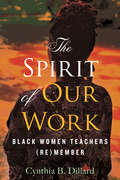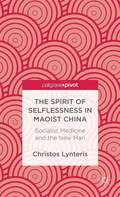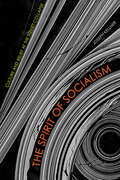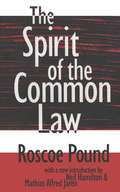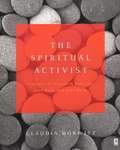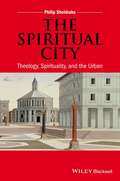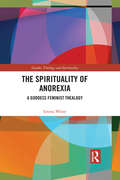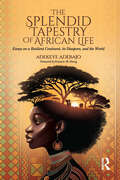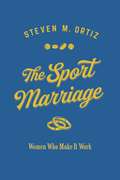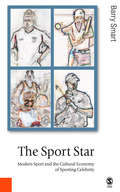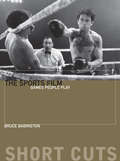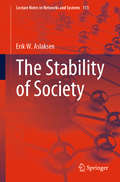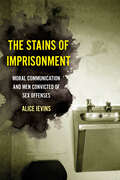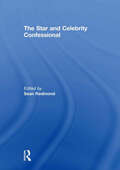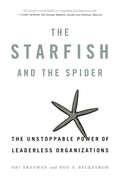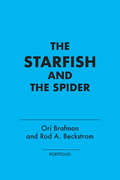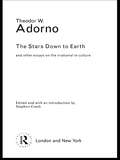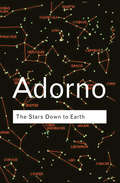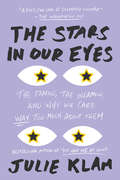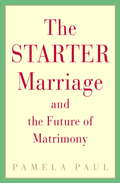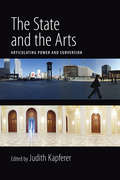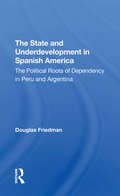- Table View
- List View
The Spirit of Our Work: Black Women Teachers (Re)member
by Cynthia DillardAn exploration of how engaging identity and cultural heritage can transform teaching and learning for Black women educators in the name of justice and freedom in the classroomIn The Spirit of Our Work, Dr. Cynthia Dillard centers the spiritual lives of Black women educators and their students, arguing that spirituality has guided Black people throughout the diaspora. She demonstrates how Black women teachers and teacher educators can heal, resist and (re)member their identities in ways that are empowering for them and their students. Dillard emphasizes that any discussion of Black teachers&’ lives and work cannot be limited to truncated identities as enslaved persons in the Americas.The Spirit of Our Work addresses questions that remain largely invisible in what is known about teaching and teacher education. According to Dillard, this invisibility renders the powerful approaches to Black education that are imbodied and marshaled by Black women teachers unknown and largely unavailable to inform policy, practice, and theory in education. The Spirit of Our Work highlights how the intersectional identities of Black women teachers matter in teaching and learning and how educational settings might more carefully and conscientiously curate structures of support that pay explicit and necessary attention to spirituality as a crucial consideration.
The Spirit of Selflessness in Maoist China
by Christos LynterisAssuming power in 1949, the Chinese Communist Party was soon faced with a crucial problem: how to construct the socialist 'New Man'? Using Foucault's theory of 'technologies of the self', Lynteris examines the conflict between self-cultivation and the abolition of the self in the biopolitically neuralgic field of 'socialist medicine'.
The Spirit of Socialism: Culture and Belief at the Soviet Collapse
by Joseph KellnerThe Spirit of Socialism is a cultural history of the Soviet collapse. It examines the millions of Soviet people who, during the cascading crises of the collapse and the post-Soviet transition, embarked on a spirited and highly visible search for new meaning. Amid profound disorientation, these seekers found direction in their horoscopes, or behind gurus in saffron robes or apocalyptic preachers, or by turning from the most basic premises of official science and history to orient themselves anew. The beliefs they seized on and, even more, the questions that guided their search reveal the essence of late-Soviet culture and its legacy in post-Soviet Russia.To skeptical outsiders, the seekers appeared eccentric, deviant, and above all un-Soviet. Yet they came to their ideas by Soviet sources and Soviet premises. As Joseph Kellner demonstrates, their motley beliefs reflect modern values that formed the spiritual core of Soviet ideology, among them a high regard for science, an informed and generous internationalism, and a confidence in humanity to chart its own course. Soviet ideology failed, however, to unite these values in an overarching vision that could withstand historical change.And so, as The Spirit of Socialism shows, the seekers asked questions raised but not resolved by the Russian Revolution and subsequent Soviet order—questions of epistemic authority, of cultural identity, and of history's ultimate meaning. Although the Soviet collapse was not the end of history, it was a rupture of epochal significance, whose fissures extend into our own uncertain era.
The Spirit of the Common Law
by Roscoe PoundThe Spirit of the Common Law is one of Roscoe Pound's most notable works. It contains the brilliant lectures he delivered at Dartmouth College in the summer of 1921. It is a seminal book embodying the spiritual essence of sociological jurisprudence by its leading prophet. This work is both a celebration of the common law and a warning for common law judges and lawyers to return to and embrace the pragmatism and judicial empiricism that define and energize the common law. The two fundamental doctrines of the common law, Pound writes, are the doctrine of precedents and the doctrine of supremacy of law.In an earlier preface, Justice Arthur J. Goldberg writes that The Spirit of the Common Law will always be treasured by judges and lawyers for its philosophy and history, but more importantly for Roscoe Pound's optimism and faith in the capacity of law to keep up with the times without sacrificing fundamental values. It is a faith built upon the conviction that the present is not to be divorced from the past, but rather that the past and the present are to be built upon to make a better future. Neil Hamilton and Mathias Alfred Jaren provide a biographical introduction to the book. They discuss the various influences upon Pound's scholarly pursuits and they analyze many of his writings that led up to The Spirit of the Common Law. This volume is a necessary addition to the libraries of legal scholars and professionals, sociologists, and philosophers.
The Spiritual Activist: Practices to Transform Your life, your Work and Your World
by Claudia HorwitzPractical guide to individual and social transformation.
The Spiritual City: Theology, Spirituality and the Urban
by Philip SheldrakeA Spiritual City provides a broad examination of the meaning and importance of cities from a Christian perspective. Contains thought-provoking theological and spiritual reflections on city-making by a leading scholar Unites contemporary thinking about urban space and built environments with the latest in urban theology Addresses the long-standing anti-urban bias of Christianity and its emphasis on inwardness and pilgrimage Presents an important religious perspective on the potential of cities to create a strong human community and sense of sacred space
The Spirituality of Anorexia: A Goddess Feminist Thealogy (Gender, Theology and Spirituality)
by Emma WhiteWidely popularized images of unobtainable and damaging feminine ideals can be a cause of profound disjunction between women and their bodies. A consequence of this dissonance is an embodied performance of these ideals with the potential development of disordered eating practices, such as anorexia nervosa. This book develops a spirituality of anorexia by suggesting that these eating disorders are physical symptoms of the general repression of feminine nature in our culture. Furthermore, it puts forward Goddess feminism as a framework for a healing therapeutic model to address anorexia and more broadly, the "slender ideal" touted by society. The book focuses on the female body in contemporary society, specifically the development of anorexia nervosa, and what this expression communicates about female embodiment. Drawing upon the work of a variety of theorists, social commentators, liberation theologians and thealogians, it discusses the benefits of adopting female-focused myths, symbols and rituals, drawing upon the work of Marion Woodman and Naomi Goldenberg. Ultimately, it theorises a thealogical approach to anorexia aimed at displacing the damaging discourses that undermine women in the twenty-first century. Offering an alternative model of spirituality and embodiment for contemporary women, this book will be of keen interest to scholars of theology, religious studies, gender studies and psychology.
The Splendid Tapestry of African Life: Essays on a Resilient Continent, its Diaspora, and the World
by Adekeye AdebajoThe 145 essays in this comprehensive, concise, and highly readable book represent three decades of Adekeye Adebajo’s reflections and writing on the history, regional integration, politics, military rule, foreign policy, international relations, geo-politics, culture, film, sports, and travel of Africa and its diaspora. The legacies of this Black Atlantic in the Americas, Europe, and the Caribbean are examined panoramically, as Africa’s independence struggles from the 1950s were also mirrored by similar battles in the Caribbean and America’s civil rights struggle. The volume further assesses the world beyond global Africa from a Pan-African perspective. This book thus seeks to capture the zeitgeist of the post-apartheid era after the five-century quest for liberation from the twin scourges of the European-led transatlantic slavery and colonialism. The essays ultimately encapsulate Pan-African efforts to break the chains of Western slavery and colonial exploitation, and to assert global Africa’s own proud histories, cultures, and identities.Print edition not for sale in Sub-Saharan Africa.
The Sport Marriage: Women Who Make It Work (Sport and Society)
by Steven M. OrtizIn The Sport Marriage, Steven M. Ortiz draws on studies he conducted over nearly three decades that focus on the marital realities confronted by women married to male professional athletes. These women, who are usually portrayed in unflattering and/or unrealistic terms, face enormous challenges in their attempts to establish and maintain functional marital and family lives while the husband routinely puts his career first. Ortiz defines the traditional sport marriage as a career-dominated marriage, illustrating how it encourages women to contribute to their own subordination through adherence to an unwritten rulebook and a repertoire of self-management strategies. He explains how they make invaluable contributions to their husbands’ careers while adjusting to public life and trying to maintain family privacy, managing power and control issues, and coping with pervasive groupies, overinvolved mothers, a culture of infidelity, and husbands who prioritize team loyalty. He gives these historically silent women a voice, offering readers perceptive and sensitive insight into what it means to be a woman in the male-dominated world of professional sports.
The Sport Star: Modern Sport and the Cultural Economy of Sporting Celebrity (Published in association with Theory, Culture & Society)
by Barry SmartWhy are sport stars central to celebrity culture? What are the implications of their fame? Proceeding from a broadly based discussion of heroism, fame and celebrity, Smart addresses a number of prominent modern sports and sport stars, including Michael Jordan (basketball), David Beckham (football), Tiger Woods (golf), Anna Kournikova and the Williams sisters (tennis). He analyses the development of modern sport in the UK and USA, demonstrating the key economic and cultural factors that have contributed to the popularity of sport stars, while examining issues such as race and gender, the impact of professionalization, growing media coverage, the role of agents and the increasing presence of commercial corporations providing sponsorship and endorsement contracts. This book situates the sport star as the embodiment of the various tensions of age, class, race, gender and culture. It argues that sporting figures possess an increasingly rare quality of authenticity that gives them the capacity to lift and inspire people. The book is a major contribution to the sociology and culture of sport and celebrity.
The Sports Film
by Bruce BabingtonAfter covering the genre's early history and theorizing its general characteristics, this volume then focuses on specific instances of sports films, such as the biopic, the sports history film, the documentary, the fan film, the boxing film, and explores issues such as gender, race, spectacle and silent comedy. Four major films are then closely analysed -- Chariots of Fire, Field of Dreams, the Indian cricket epic Lagaan, and Oliver Stone's Any Given Sunday. While recording American film's importance to the genre, the book resists the conventional over-concentration on American cinema and sports by its attention to other cinemas, for example the British, Indian, Australian, South Korean, Thai, German, New Zealand, Spanish, and so on, with the many different sports they depict.
The Sports Film: Games People Play (Short Cuts)
by Bruce BabingtonAfter covering the genre's early history and theorizing its general characteristics, this volume then focuses on specific instances of sports films, such as the biopic, the sports history film, the documentary, the fan film, the boxing film, and explores issues such as gender, race, spectacle and silent comedy. Four major films are then closely analysed – Chariots of Fire, Field of Dreams, the Indian cricket epic Lagaan, and Oliver Stone's Any Given Sunday. While recording American film's importance to the genre, the book resists the conventional over-concentration on American cinema and sports by its attention to other cinemas, for example the British, Indian, Australian, South Korean, Thai, German, New Zealand, Spanish, and so on, with the many different sports they depict.
The Spy In The Coffee Machine: The End of Privacy as We Know It
by Kieron O'Hara Nigel ShadboltWhat do you know about the new surveillance state that has been created in the wake of pervasive computing - that is, the increasing use of very small and simple computers in all sorts of host - from your computer to your coat? Well, these little computers can communicate via the web and form powerful networks whose emergent behaviour can be very complex, intelligent, and invasive. The question is: how much of an infringement on privacy are they? Could these intelligent networks be used by governments, criminals or terrorists to undermine privacy or commit crimes? From CCTVs to blogging, from cookies to RFID tags, we are sleepwalking into a new state of global hypersurveillance. And when even cans of Coke are connected to the internet, the risk of someone misusing this information is very high indeed. Kieron O'Hara is Senior Research Fellow in Electronics and Computer Science at the University of Southampton, UK. Nigel Shadbolt is Professor of Artificial Intelligence at the University of Southampton, UK, and was President of the British Computer Society in 2006-7.
The Stability of Society (Lecture Notes in Networks and Systems #113)
by Erik W. AslaksenIn this book, Erik W. Aslaksen builds on the view and model of society introduced in The Social Bond (Springer 2018), which portrays society as an information-processing system, and as both the result of the information and of the environment in which the information processing takes place. The processing power is provided by the individual, but is also greatly enhanced by the interaction between individuals, forming the collective intelligence that drives the evolution of society. In particular, this book focuses on the stability of that evolution, an issue that is of increasing concern given the current polarisation of the world society, both politically and economically, and the resultant interference in the operation of the collective intelligence. When we approach society as a genus and its evolution as a sequence of species, such as the family, clan, fiefdom, kingdom, and nation-state, the development of the next species – the world society – is now being thwarted by the desire of a minority to maintain a hegemonial position that resulted from a singularity in the process.
The Stag Hunt and the Evolution of Social Structure
by Brian SkyrmsBrian Skyrms' study of ideas of cooperation and collective action explores the implications of a prototypical story found in Rousseau's A Discourse on Inequality. It is therein that Rousseau contrasts the pay-off of hunting hare (where the risk of non-cooperation is small and the reward equally small) against the pay-off of hunting the stag (where maximum cooperation is required but the reward is much greater. ) Thus, rational agents are pulled in one direction by considerations of risk and in another by considerations of mutual benefit. Written with Skyrms' characteristic clarity and verve, The Stage Hunt will be eagerly sought by readers who enjoyed his earlier work Evolution of the Social Contract. Brian Skyrms, distinguished Professor of Logic and Philosophy of Science and Economics at the University of California at Irvine and director of its interdisciplinary program in history and philosophy of science, has published widely in the areas of inductive logic, decision theory, rational deliberation and causality. Seminal works include Evolution of the Social Contract (Cambridge, 1996), The Dynamics of Rational Deliberation (Harvard, 1990), Pragmatics and Empiricism (Yale, 1984), and Causal Necessity (Yale, 1980).
The Stains of Imprisonment: Moral Communication and Men Convicted of Sex Offenses (Gender and Justice #10)
by Alice IevinsA free open access ebook is available upon publication. Learn more at www.luminosoa.org. Recent decades have seen a widespread effort to imprison more people for sexual violence. The Stains of Imprisonment offers an ethnographic account of one of the worlds that this push has created: an English prison for men convicted of sex offenses. This book examines the ways in which prisons are morally communicative institutions, instilling in prisoners particular ideas about the offenses they have committed—ideas that carry implications for prisoners' moral character. Investigating the moral messages contained in the prosaic yet power-imbued processes that make up daily life in custody, Ievins finds that the prison she studied communicated a pervasive sense of disgust and shame, marking the men it held as permanently stained. Rather than promoting accountability, this message discouraged prisoners from engaging in serious moral reflection on the harms they had caused. Analyzing these effects, Ievins explores the role that imprisonment plays as a response to sexual harm, and the extent to which it takes us closer to and further from justice.
The Star and Celebrity Confessional
by Sean RedmondIn this book the different manifestations, meanings, and processes of the star and celebrity confessional will be explored. The confessional is taken to be any moment in which a star, celebrity, or fan engages in revelatory acts that are considered to be authentic, heart-felt, and honest. These confessional encounters can take place in an interview, through performance and presentation events, online, and in ‘unscripted’ encounters. A star may break down in tears, or reveal a previously unknown truth about their private life. However, this authenticity is often found to have been manufactured, or is timed to occur against a new release or product launch. Alternatively, the desire to confess may be seen to draw attention to the centrality of pseudo forms of emotion in contemporary culture and the obsessional behaviour it produces. In this book authors consider acts of confession by celebrities such as Tom Cruise, Michael Jackson, Jade Goody, Britney Spears, Sarah Jessica Parker, Tracey Emin, and Russell Crowe.
The Starfish and the Spider: The Unstoppable Power of Leaderless Organizations
by Ori Brafman Rod A. BeckstromIf you cut off a spider's head, it dies, but if you cut off a starfish's leg, it grows a new one, and that leg can grow into an entirely new starfish. Traditional top-down organizations are like spiders, but now starfish organizations are changing the face of business and the world.
The Starfish and the Spider: The Unstoppable Power of Leaderless Organizations
by Ori Brafman Rod A. BeckstromIf you cut off a spider's head, it dies. But if you cut off a starfish's leg, it grows a new one, and that leg can grow into an entirely new starfish. Traditional top-down organizations are like spiders, but now starfish organizations are changing the face of business and the world. What's the hidden power behind the success of Wikipedia, Craigslist, and Skype? What do eBay and General Electric have in common with the abolitionist and women's rights movements? What fundamental choice put General Motors and Toyota on vastly different paths? How could winning a Supreme Court case be the biggest mistake MGM could have made? After five years of ground-breaking research, Ori Brafman and Rod A. Beckstrom share some unexpected answers, gripping stories, and a tapestry of unlikely connections. THE STARFISH AND THE SPIDER argues that organizations fall into two categories: traditional "spiders," which have a rigid hierarchy and top-down leadership, and revolutionary "starfish," which rely on the power of peer relationships. It reveals how established companies and institutions, from IBM to Intuit to the U. S. government, are also learning how to incorporate starfish principles to achieve success. Find out: * How the Apaches fended off the powerful Spanish army for 200 years. * The power of a simple circle. * The importance of catalysts who have an uncanny ability to bring people together. * How the Internet has become a breeding ground for leaderless organizations. * How Alcoholics Anonymous has reached untold millions with only a shared ideology and without a leader.
The Stars Down to Earth (Routledge Classics)
by Theodor AdornoThe Stars Down to Earth shows us a stunningly prescient Adorno. Haunted by the ugly side of American culture industries he used the different angles provided by each of these three essays to showcase the dangers inherent in modern obsessions with consumption. He engages with some of his most enduring themes in this seminal collection, focussing on the irrational in mass culture - from astrology to new age cults, from anti-semitism to the power of neo-fascist propaganda. He points out that the modern state and market forces serve the interest of capital in its basic form. Stephan Crook's introduction grounds Adorno's arguments firmly in the present where extreme religious and political organizations are commonplace - so commonplace in fact that often we deem them unworthy of our attention. Half a century ago Theodore Adorno not only recognised the dangers, but proclaimed them loudly. We did not listen then. Maybe it is not too late to listen now.
The Stars Down to Earth (Routledge Classics)
by Theodor AdornoThe Stars Down to Earth shows us a stunningly prescient Adorno. Haunted by the ugly side of American culture industries he used the different angles provided by each of these three essays to showcase the dangers inherent in modern obsessions with consumption. He engages with some of his most enduring themes in this seminal collection, focusing on the irrational in mass culture - from astrology to new age cults, from anti-semitism to the power of neo-fascist propaganda. He points out that the modern state and market forces serve the interest of capital in its basic form. Stephan Crook's introduction grounds Adorno's arguments firmly in the present where extreme religious and political organizations are commonplace - so commonplace in fact that often we deem them unworthy of our attention. Half a century ago Theodore Adorno not only recognised the dangers, but proclaimed them loudly. We did not listen then. Maybe it is not too late to listen now.
The Stars in Our Eyes: The Famous, the Infamous, and Why We Care Way Too Much About Them
by Julie KlamFrom bestselling author Julie Klam comes a lively and engaging exploration of celebrity: why celebrities fascinate us, what it means to be famous today, and why celebrities are so important. “When I was young I was convinced celebrities could save me,” Julie Klam admits in The Stars in Our Eyes, her funny and personal exploration of fame and celebrity. As she did for subjects as wide-ranging as dogs, mothers, and friendship, Klam brings her infectious curiosity and crackling wit to the topic of celebrity. As she admits, “I’ve always been enamored with celebrities,” be they movie stars, baseball players, TV actors, and now Internet sensations. “They are the us we want to be.” Celebrities today have a global presence and can be, Klam writes, “some girl on Instagram who does nude yoga and has 3.5 million followers, a thirteen-year-old ‘viner,’ and a Korean rapper who posts his videos that are viewed millions of times.” In The Stars in Our Eyes, Klam examines this phenomenon. She delves deep into what makes someone a celebrity, explains why we care about celebrities more than ever, and uncovers the bargains they make with the public and the burdens they bear to sustain this status. The result is an engaging, astute, and eye-opening look into celebrity that reveals the truths about fame as it elucidates why it’s such an important part of life today.
The Starter Marriage and the Future of Matrimony
by Pamela PaulThe Starter Marriage and the Future of Matrimony is a pioneering study of first marriages lasting five years or less and ending without children, and of the changing face of matrimony in America. According to the brilliant trend analyst and journalist Pamela Paul, "It's easy to conclude that the starter marriage trend bodes ill for the state of marriage. After all, we're getting married, screwing it up, and divorcing--a practice that certainly isn't strengthening our sense of trust, family, or commitment. But though starter marriages seem like a grim prospect, there is also an upside. For one thing, if people are going to divorce, better to do so after a brief marriage in which no children suffer the consequences." But are there other consequences of starter marriages? And what causes these marriages to fail in the first place?In today's matrimania culture, weddings, marriage, and family are clearly goals to which most young Americans aspire. Why are today's twenty- and thirtysomethings--the first children-of-divorce generation--so eager to get married, and so prone to failure? Are Americans today destined to jump in and out of marriage? At a time when marriage at age twenty-five can mean a sixty-year active commitment, could "serial marriages" be the wave of the future? Drawing on more than sixty interviews with starter marriage veterans and on exhaustive re-search, Pamela Paul explores these questions, putting the issues into social and cultural perspective. She looks at the hopes and motivations of couples marrying today, and examines the conflict between our cultural conception of marriage and the society surrounding it. Most important, this lively and engaging narrative examines what the starter marriage trend means for the future of matrimony in this country--how and why we'll continue to marry in the twenty-first century.
The State And The Arts
by Judith KapfererJudith Kapferer and her collaborators present an insightful volume that interrogates relations between the state and the arts in diverse national and cultural settings. The authors critique the taken-for-granted assumption about the place of the arts in liberal or social democratic states and the role of the arts in supporting or opposing the ideological work of government and non-government institutions. This innovative volume explores the challenges posed by the state to the arts and by the arts to the state, focusing on several transformations of the interrelations between state and commercial arts policies in the current era. These ongoing challenges include the control of repressive tolerance, complicity with and resistance to state power, and the commoditization of the arts, including their accommodation to market and state apparatuses. While endeavouring to avoid the currently dominant pragmatic and didactic priorities of officialdom, the contributors tackle social and cultural policy and practice in the arts as well as connections between national states and dissenting art from a range of genres.
The State And Underdevelopment In Spanish America: The Political Roots Of Dependency In Peru And Argentina
by Douglas FriedmanChallenging the dependency theory approach to the origin of underdevelopment in Spanish America, this book argues that internal political and economic factors led the nations of the region to become dependent and underdeveloped during the nineteenth century. Dr. Friedman focuses on Peru and Argentina in the aftermath of their wars of independence to show how underdevelopment and dependency resulted from a crisis of the state brought about by the loss of legitimacy of Spanish colonial rule. Class conflicts had been effectively managed by the colonial state; its collapse, Dr. Friedman demonstrates, created conditions of intense inter- and intra-class conflicts, chiefly political in nature, which weak post-independence governments found impossible to restrain. Left with little authority, legitimacy, or control over internal resources, the fledging Peruvian and Argentine states turned to external sources for the capabilities with which to begin the process of consolidating their internal power. By the last half of the nineteenth century, both Peru and Argentina had chosen a course that led to their integration into the international economy as dependent nations.
